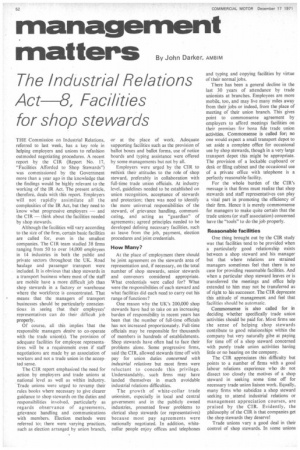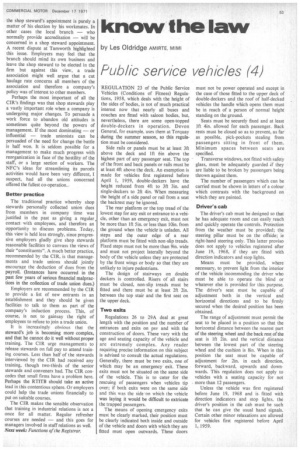management
Page 54

Page 55

If you've noticed an error in this article please click here to report it so we can fix it.
matters By John Darker, AMEN
The In Relations Act 8, Facilities for shop stewards
THE Commission on Industrial Relations, referred to last week, has a key role in helping employers and unions to refashion outmoded negotiating procedures. A recent report by the CIR (Report No, 17, "Facilities Afforded to Shop Stewards") was commissioned by the Government more than a year ago in the knowledge that the findings would be highly relevant to the working of the IR Act. The present article, therefore, deals with this report. Employers will not rapidly assimilate all the complexities of the IR Act, but they need to know what progressive employers — and the CIR — think about the facilities needed by shop stewards.
Although the facilities will vary according to the size of the firm, certain basic facilities are called for, even in the smallest companies. The CIR team studied 38 firms ranging from 50 to over 14,000 employees in 14 industries in both the public and private sectors throughout the UK. Road haulage and passenger transport were included. It is obvious that shop stewards in a transport business where most of the staff are mobile have a more difficult job than shop stewards in a factory or warehouse where the workforce is concentrated. That means that the managers of transport businesses should be particularly conscientious in seeing that their employees' representatives can do their difficult job properly.
Of course, all this implies that the responsible managers desire to co-operate with the trade union(s). The provision of adequate facilities for employee representatives will be a requirement even if staff negotiations are made by an association of workers and not a trade union in the accepted sense.
The CIR report emphasized the need for action by employers and trade unions at national level as well as within industry. Trade unions were urged to revamp their rules books where necessary to give clearer guidance to shop stewards on the duties and responsibilities involved, particularly as regards observance of agreements, grievance handling and communications with members. Election methods were referred to; there were varying practices, such as election arranged by union branch, or at the place of work. Adequate supporting facilities such as the provision of ballot boxes and ballot forms, use of notice boards and typing assistance were offered by some managements but not by all.
Employers were urged by the CIR to rethink their attitudes to the role of shop steward, preferably in collaboration with full-time trade union officials. At industry level, guidelines needed to be established on union recognition, acceptance of stewards and protection: there was need to identify the more universal responsibilities of the steward, of grievance handling, communicating, and acting as "guardian" of agreements; agreed principles needed to be developed defining necessary facilities, such as leave from the job, payment, election procedures and joint credentials.
How Many?
At the place of employment there should be joint agreement on the stewards area of representation and, if necessary, on the total number of shop stewards, senior stewards and convenors considered appropriate. What credentials were called for? What were the responsibilities of each steward and what facilities did each need to carry out his range of functions?
One reason why the UK's 200,000 shop stewards have had to take on an increasing burden of responsibility in recent years has been that the number of full-time officials has not increased proportionately. Full-time officials may be responsible for thousands of members in hundreds of establishments. Shop stewards have often had to face their problems alone. Some progressive firms, said the CIR. allowed stewards time off with pay for union duties concerned with industrial relations but most firms were reluctant to concede this privilege. Understandably, such firms may have landed themselves in much avoidable industrial relations difficulties.
The growth of white-collar trade unionism, especially in local and central government and in the publicly owned industries, presented fewer problems to clerical shop stewards (or representatives) because most pay agreements were nationally negotiated. In addition, whitecollar people enjoy offices and telephones and typing and copying facilities by virtue of their normal jobs.
There has been a general decline in the last 30 years of attendance by trade unionists at branches. Employees are more mobile, too, and may live many miles away from their jobs or indeed, from the place of meeting of their union branch. This gives point to commonsense agreement by employers to afford meetings facilities on their premises for bona fide trade union activities. Commonsense is called for; no one would expect a small transport depot to set aside a complete office for occasional use by shop stewards, though in a very large transport depot this might be appropriate. The provision of a lockable cupboard or desk or filing cabinet and the occasional use of a private office with telephone is a perfectly reasonable facility.
For the whole burden of the CIR's message is that firms must realize that shop stewards and staff representatives can play a vital part in promoting the efficiency of their firm. Hence it is merely commonsense for managers to make quite certain that the trade unions (or staff association) concerned have the "tools" to do the job properly.
Reasonable facilities
One thing brought out by the CIR study was that facilities tend to be provided when a particularly good relationship exists between a shop steward and his manager but that where relations are strained managers sometimes feel that there is no case for providing reasonable facilities. And when a particular shop steward leaves or is transferred the meetings and office help extended to him may not be transferred as of right to his successor. The CIR deprecate this attitude of management and feel that facilities should be automatic.
Commonsense is also called for in deciding whether specifically trade union activities should be paid for. Most firms see the sense of helping shop stewards contribute to good relationships within the company but very naturally gibe at paying for time off of a shop steward concerned with purely trade union activities having little or no bearing on the company.
The CIR appreciates this difficulty but points to a number of firms with a good labour relations experience who do not dissect too closely the motives of a shop steward in seeking some time off' for necessary trade union liaison work. Equally, many firms who subsidize a shop steward seeking to attend industrial relations or management appreciation courses, are praised by the CIR. Evidently, the philosophy of the CIR is that companies get the shop stewards they deserve!
Trade unions vary a good deal in their control of shop stewards. In some unions the shop steward's appointment is purely a matter of his election by his workmates. In other cases the local branch — who normally provide accreditation — will be concerned in a shop steward appointment. A recent dispute at Tamworth highlighted this issue. Employers may feel that the branch should mind its own business and leave the shop steward to be elected in the firm but against this view, a trade association might well argue that a cut haulage rate concerns all members of the association and therefore a company's policy was of interest to other members.
Perhaps the most important of all the CIR's findings was that shop stewards play a vastly important role when a company is undergoing major changes. To persuade a work force to abandon old attitudes is sometimes quite beyond the powers of management. If the most dominating — or influential — trade unionists can be persuaded of the need for change the battle is half won. It is seldom possible for a management to make much progress with reorganization in face of the hostility of the staff, or a large section of workers. The NFC's ideas for streamlining its parcels activities would have been very different, I suspect, had all the unions concerned offered the fullest co-operation.
Better practice
The traditional practice whereby shop stewards personally collected union dues from members in company time was justified in the past as giving a regular contact with employees, and therefore an opportunity to discuss problems. Today, this view is held less strongly, since progressive employers gladly give shop stewards reasonable facilities to canvass the views of their "constituents". A much better practice, recommended by the CIR, is that managements and trade unions should jointly encourage the deduction of dues from the payroll. (Instances have occurred in the past few years of serious financial malpractices in the collection of trade union dues.) Employers are recommended by the CIR to provide a list of new entrants in an establishment and they should be given facilities to talk to them as part of the company's induction process. This, of course, is not to gainsay the right of employees to refuse to join a trade union.
It is increasingly obvious that the steward's job is becoming more complex, and that he cannot do it well without proper training. The CIR urge managements to release stewards on full pay to attend training courses. Less than half of the stewards interviewed by the CIR had received any training, though two-thirds of the senior stewards and conveners had. The CIR concedes that small firms have a problem here. Perhaps the RTITB should take an active lead in this contentious sphere. Or employers could help the trade unions financially to put on suitable courses.
The CIR makes the sensible observation that training in industrial relations is not a once for all matter. Regular refresher courses are needed — and this goes for managers involved in staff relations as well. Next week: Functions of the Registrar.
































































































